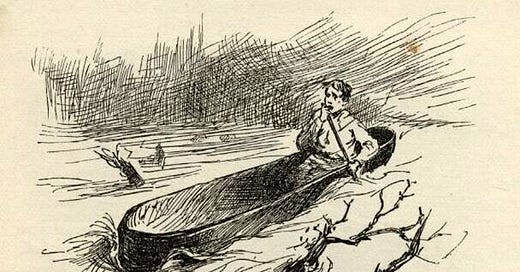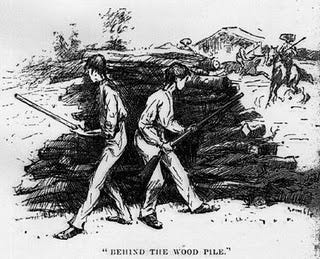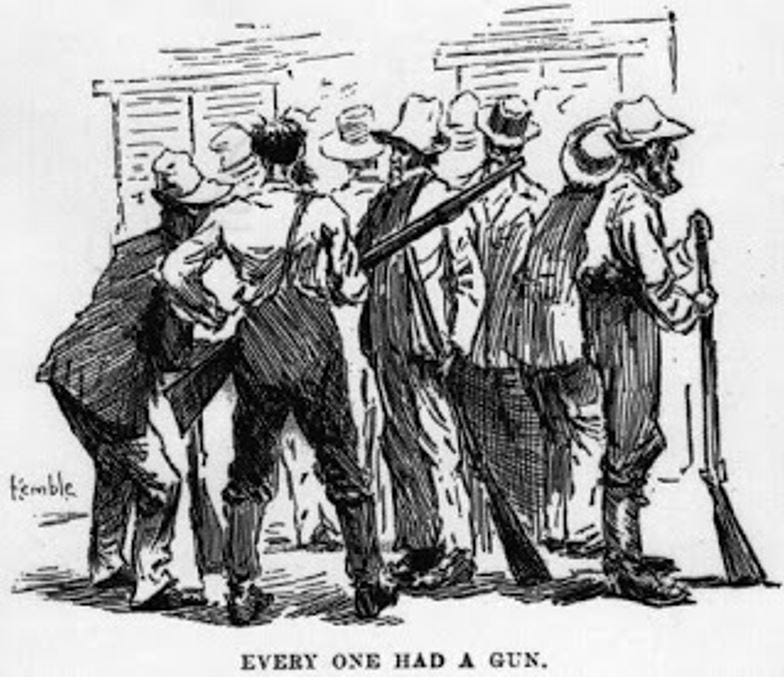Huck Finn: Chapters 14-18
"You feel mighty free and easy and comfortable on a raft."
Hello, readers!
We’re about 150 pages into Huck Finn (at least in my edition) and I’m amazed at how much depth this story has — especially compared to what I was expecting based on high school reading of it. We’re seeing Huck grow up, we’re seeing the complex interplay of race and friendship, and we’re seeing Twain’s cynical view of the gilded and hypocritical realm of adulthood.
What do you think so far? I always enjoy hearing your thoughts!
Let’s dive in to chapters 14-18. Next week I’ll recap chapters 19-23.
Huck’s Coming of Age
Whereas Tom Sawyer is a bit more of a pure, youthful adventure story, Huck Finn’s self-narrated tale offers a lot of growth and even introspection. In Chapter 14, I enjoyed the comic conversation about kings and power and wisdom — it was lighthearted on the surface but actually had more depth upon reflection. A lot of the passed-down wisdom Huck was exposed to would have come from places of power and privilege, like King Solomon. Jim rightly points out that that guy seemingly had no concept of day-to-day living, especially in the kind of survival mode that him and Huck were in. So could he have anything truly useful to say? A really interesting point of view, if nothing else.
I also appreciated the clear dichotomy between Huck’s youth and Jim’s maturity:
“I said these kinds of things was adventures; but he said he didn’t want no more adventures.”
It is absolutely true that what you see as adventurous in early life becomes quite a bit more fraught later on.
In Chapter 15, we had the scene with the fog and Huck being separated from Jim for a bit. It’s a good section of writing; Twain really put us on the river in that dense fog and it’s durn scary. Once the pair are finally reunited, though, Huck takes a sour turn and pranks Jim into thinking the whole thing was a dream. Earnest Jim didn’t like that and Huck learned that youthful pranks can do emotional damage:
“I didn’t do him no more mean tricks, and I wouldn’t done that one if I’d a knowed it would make him feel that way.”
Come Chapter 16, Huck is getting a bit sick of Jim. If you think about it, two guys being stuck together like that is bound to lead to some disharmony at some point. But Huck chalks it up to a racial problem and thinks about turning Jim in. Once Jim admits that Huck is his only friend at the moment, the boy thankfully has a change of heart:
“I was paddling off, all in a sweat to tell on him; but when he says this, it seemed to kind of take the tuck all out of me.”
Huck had to wrestle with his conscience and ask himself if it would truly feel better to do the “right” thing and turn in Jim. He rightly concluded that he would not feel better and happily went back to his friend. To have an impulsive thought and then think about it and change your mind is a clear sign of both growth and maturity from our main character. Great characterization from Mr. Twain.
The Grangerfords and Shepherdsons
Chapters 17 and 18, both longer than usual, detail a family feud that highlights much of what Twain was writing about through his entire career.
Huck stumbles upon the Grangerford home and is immediately taken in under the name “Gorge Jaxon” (lol). Huck’s stance is generally one of distrust (hence the fake name and story) until you’ve proven him otherwise; as an orphan in a hard land, it’s his necessary mindset. But the family is nice enough and the house is nice and everyone has nice manners — until it comes to the Shepherdsons.
The two families have been feuding as long as anyone can remember and nobody really knows why anymore. Honor and appearances seem to be more important than just about anything else. Twain abhorred this kind of hypocrisy and most of his fictional characters did too. In fact, the term “the gilded age” was coined by Twain and that idea remained one of the most consistent in his catalog.
After a series of Shakespearean tragedies, including the death of young Buck, Huck finally escapes into a new chapter.
LitCharts, one of my go-to sources when looking for some deeper literary analysis, offered a particularly insightful note on this scene:
“Even though the Grangerfords were a welcoming surrogate family to Huck, their lives were so cramped up with their mindless feud that no one could feel free in their company. Indeed, it is only on the raft, on the wide-open river, in the company of his surrogate father Jim, so to speak, that Huck can feel free and comfortable at all.”
Indeed, you’d think that the raft itself would be cramped and uncomfortable, but it’s actually a life of mindlessness and antiquated rule-following that is the untenable one. I’ll leave you with the final lines of chapter 18, which are among my few favorite of the book so far:
“I was powerful glad to get away from the feuds . . . We said there warn’t no home like a raft, after all. Other places do seem so cramped up and smothery, but a raft don’t. You feel mighty free and easy and comfortable on a raft.”
Thanks for reading along with me and see ya next week.
-Jeremy







I felt like Chapter 16 could have been called “Huckleberry Finn, gaslighter” with the prank he pulled on Jim. It was making me angry as he did it and I realized I don’t remember any of this from when I read it in high school. I must have thought it funny then.
Also didn’t remember Huck “struggling with his conscience” deciding whether to turn Jim in or not. It is a fascinating window into the rationalization of slaveholding society that a young boy’s conscience was telling him to turn the runaway slave in rather than help him. At one point, Huck even says “what did the Widow Douglas ever do to me?” such that he walls hurt her by depriving her of her property Jim. He doesn’t have the same thought for Jim though (at least until later).
The feuds are interesting as well because they remind me of modern senseless gun violence between inner city gangs who engage in tit for tat retaliation. There’s a false honor code that serves nothing but perpetuating the feud.
Does anyone else find that Twain's commitment to getting Jim's dialect right becomes a distraction? I find myself skipping over Jim's long speeches rather than taking the time to figure out exactly what he's saying.